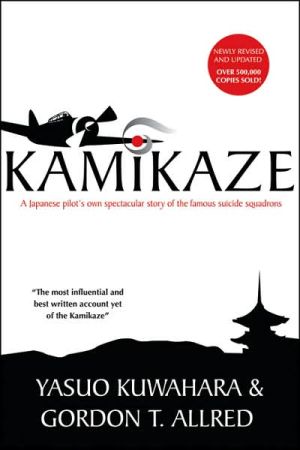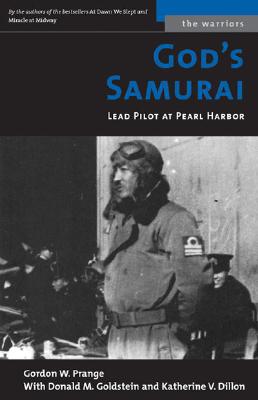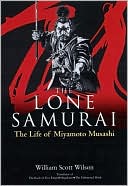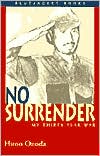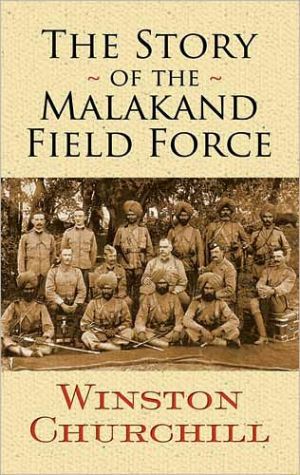Kamikaze: A Japanese Pilot's Own Spectacular Story of the Famous Suicide Squadrons
Originally published in 1957, this enduring classic—the first-ever English publication cowritten by a Japanese suicide pilot—remains a touching and insightful look into the world of the kamikaze. This edition, now completely revised, reflects the valuable insight and perspective gained by the author since the time of the book’s initial publication. From the age of 15, Yasuo Kuwahara began a life of military service that included suffering through brutal basic training, participating in...
Search in google:
Originally published in 1957, this enduring classic—the first-ever English publication cowritten by a Japanese suicide pilot—remains a touching and insightful look into the world of the kamikaze. This edition, now completely revised, reflects the valuable insight and perspective gained by the author since the time of the book’s initial publication. From the age of 15, Yasuo Kuwahara began a life of military service that included suffering through brutal basic training, participating in ferocious aerial combat against the Allies, and avoiding a suicide mission when an atomic bomb was dropped in Hiroshima, near his hometown. From being handpicked for kamikaze service to finding the discipline to die for the emperor, this history presents a firsthand account of the fascinating life of a kamikaze fighter pilot.
KAMIKAZE\ A Japanese Pilots Own Spectacular Story Of The Infamous Suicide Squadrons \ \ By Yasuo Kuwahara Gordon T. Allred \ American Legacy Media\ Copyright © 2007 Gordon T. Allred\ All right reserved.\ \ \ \ \ Chapter One\ National Glider Champion\ It is difficult, perhaps impossible, to determine where the forces eventuating in Japan's Kamikaze offensive, the strangest warfare in history, began. Ask the old man, the venerable ojiisan, with his flowing beard-the man who still wears kimono and clattering wooden geta on the streets-for he is a creature of the past. Perhaps he will tell you that these mysterious forces were born with his country over two and a half millennia ago, with Jimmu Tenno, first emperor, descendant of the Sun Goddess, Amaterasu-Omikami. Or, he may contend that their real birth came twenty centuries later, reflected in the proud spirit and tradition of the samurai, the famed and valiant warriors of feudal times.\ Whatever their beginnings, these forces focused upon me during 1943, in the midst of World War II, when I was a mere boy of only fifteen. It was then that I won the Japanese National Glider Championship.\ Back where memory blurs into veils of forgetfulness I can vaguely discern a small boy watching hawks circle above the velvet mountains of Honshu-watching enviously each afternoon. I remember how he even envied the sparrows as they chittered and flitted through the shrubbery and arched across the roofs. To fly-transcend the bondage ofgravity! What incomparable freedom! What exhilaration! What joy!\ Strangely, even then, I sensed that my future lay somewhere in the skies. At fourteen, attending Onomichi High School, I was old enough to participate in a glider training course sponsored by the Osaka Prefecture, a training that had two advantages. First, it was the chance I had waited for all my life-a chance to be in the air. Secondly, war was reverberating throughout the world, and while many students were required to spend part of their regular school time working in the factories, I was permitted to learn glider flying for two hours every day. All students, in fact, were either directly engaged in producing war materials or preparing themselves as future defenders of their country though such programs as judo, sword fighting, or marksmanship. Even grade school children were taught to self defense with sharpened bamboo shafts.\ Our glider training was conducted on a grassy field near the school, and the first three months were often frustrating since we never once moved off the ground. Fellow trainees merely took turns towing each other across the lawn, getting plenty of exercise, while the would-be pilot vigorously manipulated the wing and tail flaps with hand and foot controls, pretending that he was soaring at some awesome height in company with the eagles. Much of our time was also devoted to calisthenics, and it was apparent even then that all of our training was calculated to prepare us for great challenges and trials.\ Gradually we began taking to the air, only a few feet above the ground initially, but what excitement! Eventually, thanks to the exertions of a dozen or so young comrades, we were towed rapidly enough to ascend some sixty feet, the maximum height for a primary glider.\ Having mastered the fundamentals, we were transferred to the secondary glider, which was car-towed for the take-off and capable of remaining aloft for several minutes. It had a semi-enclosed cockpit and a control stick with a butterfly-shaped steering device for added maneuverability.\ Aside from understanding the basic mechanical requirements of glider flying, it was necessary to sense the air currents, feel them out, automatically judging their direction and intensity, like the hawks above the mountains.\ How far should I travel into the wind? Often I could determine this only by thrusting my head from the cockpit and letting the drafts cascade against my face. And at times of descent just before I had circled to soar once more upon the thermals the onrushing air tide seemed to have acquired a kind of solidity becoming almost stifling. Moments before take-off, in fact, the air impact was tremendous, nearly overwhelming, requiring all my strength to work the controls.\ How far to travel in one direction before circling, precisely how much to elevate the wing flaps to avoid stalling and still maintain maximum height ... these things were not charted beforehand. But the bird instinct was within me, and I was able to pilot my glider successfully, qualifying for national competition the following year.\ Approximately six hundred glider pilots throughout Japan, mainly high school students, had qualified for the big event at Mt. Ikoma near Nara and the great city of Osaka. The competition was divided into two phases: group and individual. Contenders could participate in either or both events and were judged on such points as time in the air, distance traveled at a specific altitude, ability to turn within a prescribed space, and angle of descent.\ Perhaps it was our intensive training, perhaps destiny, that led six of us from Onomichi High School in western Honshu to the group championship. What glee and wild rejoicing! In addition, two of us were selected from that number for individual competition against about fifty others. I was one of them.\ Every contestant was to fly four times, and points accumulated during each flight would be totaled to determine the winner. At the onset I was exceptionally tense and nervous, but such feelings soon faded, and to my immense delight my first three flights seemed almost perfect. Victory was actually in sight!\ Sunlight was warming the mountain summit when my final flight commenced. A hundred yards below on the spacious glider field, I steadied myself in the cockpit, feeling a tremor in the fragile structure that held me-delicate wood framework, curved and fastened with light aluminum and covered with silk the color of butter cups. The tow rope had been attached to a car ahead, a hook in the other end fastened to a metal ring just beneath the glider's nose. Opening and closing my hand on the control stick, I breathed deeply and concentrated on victory. "You can do it, Kuwahara," I told myself, "you can do it. You're invincible-you're going to win."\ Simultaneously my veins, even the tiniest capillaries in my skin, began to tingle. This was the biggest test of my life, a chance to be crowned the greatest high school glider pilot in the Nippon Empire.\ My craft lurched and began sliding irresistibly across the turf, and my heart rate increased along with the acceleration. Then I was lifting, confronting the air mass which suddenly seemed immensely heavy and resistant, almost like water. Lifting, lifting ... straining with the controls, feeling disconcerting vibrations. Almost as suddenly, the pressure relaxed, and the bright day itself was bearing me upward. I was above Ikoma's calm, green summit, angled sunlight turning the leaves along its western perimeter the colors of polished brass and chrome.\ I continued to climb, confident with the controls, now buoyed skyward on a powerful updraft. Soon I was beginning my first circle, working the flaps carefully to maximize my advantage, and now the glider was responding to my touch with great empathy, with a life of its own. Simultaneously, the two of us were becoming one, soaring exultantly, carried ever higher upon the mounting currents.\ Then we were making our first, broad gyration. I gazed over my shoulder at the landing strip, the upturned faces and waving hands. Three times I circled, lofting and descending, sweeping far out beyond expectation on the final one as the glider field and its throng faded. Then I became one with a flight of gulls, entranced by their whiteness against the blue of the sky. It was a good omen. Kobe Bay rejoiced in the sunlight a short distance to the east, Lake Biwa a bit farther, to the north. Thirty-eight minutes after take-off I settled to the patient earth amid a chorus of cheers.\ It took nearly half an hour for the judges to finish tallying our point totals and compare scores-one of the longest waits of my life, and my ears hummed with increasing volume as I listened for the results. I knew that I had done well, that my chances for the prize were good, but at that point nothing seemed real. Then ... then, suddenly! My name was being announced, blaring stridently over the loud speaker: "Kuwahara-Yasuo, 340 points-first place, individual competition!" Vaguely I heard the next name being announced for second place as friends slapped my back, shouted my name and cheered. I saw the faces of my family, beaming and radiant as they pushed through the throng. I was glider champion of the Nippon Empire.\ At that moment I had no idea how such a distinction would drastically alter my entire existence.\ Chapter Two\ A Predestined Decision\ Upon my return there was much festivity at the Onomichi Train Station. Teachers, students, close friends-all were there to congratulate the new champion. In addition, my family held a celebration and sumptuous dinner in my honor.\ A few days later, however, my achievement was almost forgotten. Glider training continued, but for the first time in many months life had lost its vitality. I drifted rudderless upon aimless waters, steadily growing more restless.\ In the evenings after training I wandered home with my friends, watching the sun settle beyond the mountains, a red cauldron turning the ocean westward to molten steel. Sunset was a special time-a time to have finished the hot bath, to have donned the yukata, a fight-weight, casual kimono, to slide the windows open and gaze meditatively, or to sit in one's garden contemplating the filigreed silhouette of a mulberry tree against the horizon, to savor introspection in the steam rising from a cup of ocha.\ Such traditions afforded a tentative kind of relaxation and comfort, but they did not relieve my lethargy. Nor did they assuage our growing uneasiness regarding the war. By now Guadalcanal had been lost to the Americans, and doubts had begun to form. Very subtly at first like early winter mists among the pines on our hillside, but gradually they swirled and swelled till even the rising sun could not dispel them.\ We who were young spoke of the war more enthusiastically than many of our elders. My friend Tatsuno's brother in the Navy Air Force had shot down an American plane, and many evenings such matters dominated our conversation as we strolled the road from school.\ Young though he was, small and almost frail, Tatsuno Uchida reflected a special intensity in the way he observed the sky and spoke of his brother. At times, when planes passed over, he shook his head saying, fervently, "I know Kenji will become an ace. He will bring honor to our country and to the Emperor." And of course, I always agreed. It was comforting to realize that our pilots were innately superior to the enemy, more courageous, bearers of a proud tradition, that they flew better aircraft. Did not our teachers and parents, our radios and newspapers assure us of these facts each day?\ One of those evenings shortly after my return from school, a stranger appeared at our front door, and I heard his introduction clearly: "I am Captain Hiroyoshi Mikami of the Imperial Army Air Force." Moments later he had removed his shoes and crossed our threshold. Having escorted him to our western-style reception room, our maid Reiko padded quickly off to inform my father.\ My father, a well-known contractor and most affluent man in Onomichi, continued his leisurely bath and directed my mother to entertain our new visitor. Later he emerged to extend the formalities of introduction while mother retired to supervise the maid's preparation of ban no shokuji, our evening meal.\ Meanwhile, I hovered furtively outside the guest room, certain that the visit signalled something highly portentous, listening nervously while my father and the captain exhanged the customary pleasantries, politely discussing the irrelevant, punctuating their sentences with a soft and courteous sibilance.\ "Winter is at last upon us," the captain observed.\ "Indeed, that is so," my father replied and slurped his ocha in a well bred manner.\ After they had conversed at length on matters of little significance, it was time for our meal. Mother had planned sukiyaki, and the captain had, of course, been invited to dine with us.\ As we sat upon our cushions surrounding the low, circular dinner table, the maid bustled attentively back and forth while Tomika, my sister, probed at the glowing coals with a slender pair of prongs. Mother, arranging and sugaring the beef slices with great care, half whispered, "Where is the shoyu" and Reiko hastened to the kitchen conveying much humility and murmuring plaintive, little apologies for her dereliction.\ At times I peered at Captain Mikami, very covertly, always averting my gaze whenever his eyes fell upon me, eyes that reminded me of chipped obsidian. Penetrating, unnerving.\ Throughout our meal only the two men conversed, the rest of us merely conveying our existence by faint, careful smiles and slight, courteous head bows whenever their remarks drifted our direction. In addition, however, I sensed an unusual atmosphere of restraint, of apprehension-especially on the part of my mother and sister Tomika. All of which only magnified my own.\ Father and the captain spoke tediously about many things, and little of what was said held my attention excepting their comments upon the war, especially regarding the condition of Iwo Jima, Okinawa, and other key islands. Speaking of Guadalcanal. My father reiterated the firmly entrenched conviction of many others at the time: that the departure of our troops from that area had not been a retreat but rather a "strategic withdrawal." Most assuredly, it was not an enemy triumph!\ Mikami strongly confirmed this view, discussing the great valor of our military men and their leaders at some length. As for the increased bombing of our homeland, he emphasized another common belief our noble militarists had actually known from the onset that this would happen. Consequently, there was no need for dismay. Such an eventuality had been taken into account long before our assault on Pearl Harbor. Inevitable, yes, but we were prepared materially, in mind and spirit as well, for any form of retaliation to which the enemy might resort. Ultimately, unquestionably, our divinely ordained empire would triumph. The only alternative was unthinkable.\ At last our dinner was over and I was invited to join the two men in our guest room. There, at last, our visitor's courteous evasion yielded to military directness. For a moment his dark eyes searched mine. Then, turning to my father, he said, "Kuwahara-san, you have an honorable son." I felt a sudden surge of pride. "Your son has already gained acclaim that few people his age, if any, have ever achieved."\ Father bowed slightly in humility and assent. "Domo arigato."\ "He is one of whom his esteemed father and our noble empire can be proud." Again, I received his glance. "Indeed, he can bring great honor to the family of Kuwahara." Something began to ferment inside me, a sensation much like that which I had felt at the onset of my national glider competition. I gazed at the tatami in great humility.\ "So desu ka," my father replied, attenuating the first word gutturally, feigning profound wonderment and modesty. Again the bow, one more pronounced than the first. "Domo arigato gozai mashita" he added quietly, expressing his thanks and acknowledgement in the fullest, most formal fashion.\ "Our gracious and esteemed Emperor and our honorable leaders at the Daihonei," Captain Mikami continued, referring to the Imperial Military Headquarters in Tokyo, "are seeking such young men, as you must know, young men with allegiance to His Imperial Majesty, with talent and devotion to their country ... men who will fly like avenging eagles against the enemy."\ For an instant my glance flicked from the straw tatami at my feet to my father. His eyes contained a gleam I had never seen before, and he nodded. "Indeed that is so. It is good that we have such men, and the time has arrived for us to strike with our might-with great power like the winds from heaven."\ "Hai!" The captain concurred with marked force and abruptness then paused solemnly. "As you may have supposed, I am here at your most gracious and hospitable domicile as a special representative of The Imperial Army Air Force."\ Beaming once more with carefully calculated surprise, my father again replied, "Ah so desu ka!"\ Throughout the conversation, Captain Mikami directed very few remarks at me personally, but I felt my insides begin to burn as he spoke of enlistment requirements for the Air Force and the various schools available depending upon one's performance and qualifications.\ (Continues...)\ \ \ \ \ Excerpted from KAMIKAZE by Yasuo Kuwahara Gordon T. Allred Copyright © 2007 by Gordon T. Allred. Excerpted by permission.\ All rights reserved. No part of this excerpt may be reproduced or reprinted without permission in writing from the publisher.\ Excerpts are provided by Dial-A-Book Inc. solely for the personal use of visitors to this web site. \ \
A Vital Explanation viiPublisher's Note xiiiPrologue xviPart 1National Glider Champion 1A Predestined Decision 6Winter and the Waning Days 17Part 2Instilling The Spirit 27Taiko Binta-A Splendid Game 33The Grand Way of Heaven And Earth 40A Time to Cry 49The Cost of Sushi Cake 57The Parting of Miyagame 64A Brief Reunion 73Part 3The Praying Mantis 85A Full Reparation 96Fighter Pilot 114Part 4The First Human Bombs 121High Rendezvous 126Honor and a Lost Cause 135Death Greets the New Year 140Part 5Wind Among the Lanterns 149The Miracle of Life 157Women of the Shadows 161Toyoko 165Chimes in the Night 176Ashes for the Family Shrine 186The Divine Storm 194The Lonely Place 207Part 6Lighter Than a Feather 215Battle With the Giants 222Hiroshima 230The Voice of the Emperor 244The Farewell Cup 252
